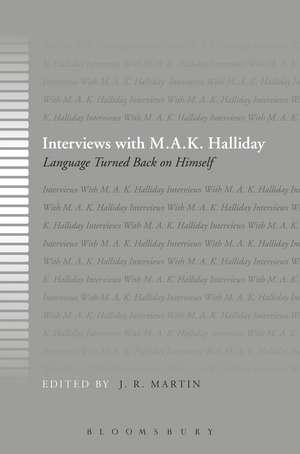Interviews with M.A.K. Halliday: Language Turned Back on Himself
Editat de Professor J. R. Martinen Limba Engleză Hardback – 13 feb 2013
| Toate formatele și edițiile | Preț | Express |
|---|---|---|
| Paperback (1) | 265.47 lei 6-8 săpt. | |
| Bloomsbury Publishing – 13 feb 2013 | 265.47 lei 6-8 săpt. | |
| Hardback (1) | 949.98 lei 6-8 săpt. | |
| Bloomsbury Publishing – 13 feb 2013 | 949.98 lei 6-8 săpt. |
Preț: 949.98 lei
Preț vechi: 1217.03 lei
-22% Nou
Puncte Express: 1425
Preț estimativ în valută:
181.80€ • 197.41$ • 152.71£
181.80€ • 197.41$ • 152.71£
Carte tipărită la comandă
Livrare economică 23 aprilie-07 mai
Preluare comenzi: 021 569.72.76
Specificații
ISBN-13: 9781441154873
ISBN-10: 1441154876
Pagini: 288
Dimensiuni: 156 x 234 x 28 mm
Greutate: 0.57 kg
Ediția:New.
Editura: Bloomsbury Publishing
Colecția Bloomsbury Academic
Locul publicării:London, United Kingdom
ISBN-10: 1441154876
Pagini: 288
Dimensiuni: 156 x 234 x 28 mm
Greutate: 0.57 kg
Ediția:New.
Editura: Bloomsbury Publishing
Colecția Bloomsbury Academic
Locul publicării:London, United Kingdom
Caracteristici
Edited by two world-renowned linguists, sensitive to the place of SFL in modern linguistics.
Notă biografică
J. R. Martin is Professor of Linguistics at the University of Sydney, Australia.
Cuprins
Introduction \ 1. With Herman Parret (1972) \ 2. With Noboru Yamaguchi & Shunichi Segawa (1977) \ 3. From The English Magazine (1981) \ 4. With M. L. Tickoo (1985) \ 5. With Paul J. Thibault \ 6. With Ruqaiya Hasan, Gunther Kress & J. R. Martin (1986) \ 7. With Michael O'Toole and Gunter Kress (1989) \ 8. With Caroline Coffin (1998) \ 9. With Manuel A. Hernández (1998) \ 10. With Geoff Thompson and Heloisa Collins (1998) \ 11. With Anne Burns (2006) \ 12. With Hu Zhuanglin and Zhu Yongsheng (2010) \ 13. With Bilal Ibne Rasheen (2010) \ 14. With J. R. Martin & Paul J. Thibault (2011) \ Bibliography \ Index
Recenzii
Edited by J. R. Martin, himself a prolific researcher in the SFL framework, the interviews span nearly 40 years, from 1972 to 2011, thus cover the major portion of the development of the theory and range of research practices and forms of engagement with real world issues that have come to be associated with it. The volume concludes with a helpful bibliography whereas as Halliday's work is, of course, prominently represented, as well as an index . In its ability to offer this polyphony of considerations from a deeply humane perspective this book is a gist to anyone interested in what language does and how it does it, from beginning graduate student to seasoned researcher.
The ontological and philosophical aspects of this collection of interviews, unlike most SFL books that cover application aspects, allow readers to have a deeper appreciation for the theory. I would recommend this book to researchers who are working closely with Halliday's theory.
The phrases "major figure", "significance" and "international influence" are commonly overblown in the contemporary academic world; but these interviews with Michael Halliday require no exaggeration. They represent the richest of testimonies to his centrality, significance, impact and enduring influence as a linguist. For the student of language at all levels this is learning by dialogue at its very best. The range, depth, generosity of spirit and creativity dedicated in these interviews to ideas about the theory and practice of language and their application to the real world are simply immense and inspiring.
Spanning four decades, these interviews with Michael Halliday provide a delightfully readable yet deeply thought-provoking exploration of the fundamental insights and continuity of stance toward the investigation of language as well as of the remarkable openness and adaptability that characterize Halliday the researcher and his work in systemic functional linguistic theory. Established researchers and those familiar with SFL as well as those who are just beginning to encounter this meaning-oriented theory of language-as was the case for my graduate students-can expect to experience wonderful "aha" moments that will help them understand more deeply the contexts and commitments that have long guided Halliday's "appliable linguistics" and the humane qualities and generosity of spirit that make it so enormously appealing as a theory of language for our times.
The ontological and philosophical aspects of this collection of interviews, unlike most SFL books that cover application aspects, allow readers to have a deeper appreciation for the theory. I would recommend this book to researchers who are working closely with Halliday's theory.
The phrases "major figure", "significance" and "international influence" are commonly overblown in the contemporary academic world; but these interviews with Michael Halliday require no exaggeration. They represent the richest of testimonies to his centrality, significance, impact and enduring influence as a linguist. For the student of language at all levels this is learning by dialogue at its very best. The range, depth, generosity of spirit and creativity dedicated in these interviews to ideas about the theory and practice of language and their application to the real world are simply immense and inspiring.
Spanning four decades, these interviews with Michael Halliday provide a delightfully readable yet deeply thought-provoking exploration of the fundamental insights and continuity of stance toward the investigation of language as well as of the remarkable openness and adaptability that characterize Halliday the researcher and his work in systemic functional linguistic theory. Established researchers and those familiar with SFL as well as those who are just beginning to encounter this meaning-oriented theory of language-as was the case for my graduate students-can expect to experience wonderful "aha" moments that will help them understand more deeply the contexts and commitments that have long guided Halliday's "appliable linguistics" and the humane qualities and generosity of spirit that make it so enormously appealing as a theory of language for our times.
